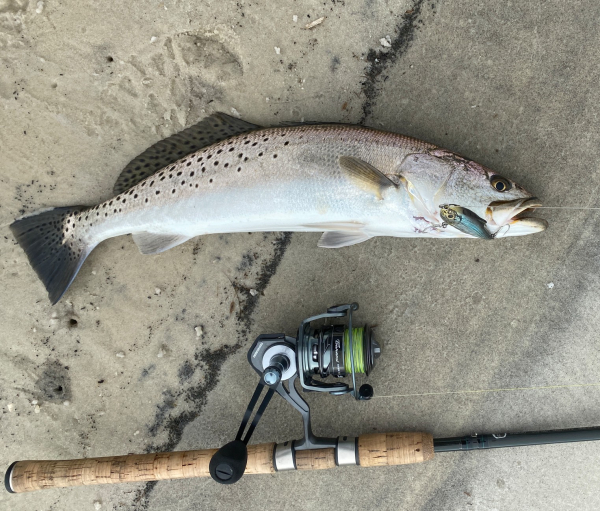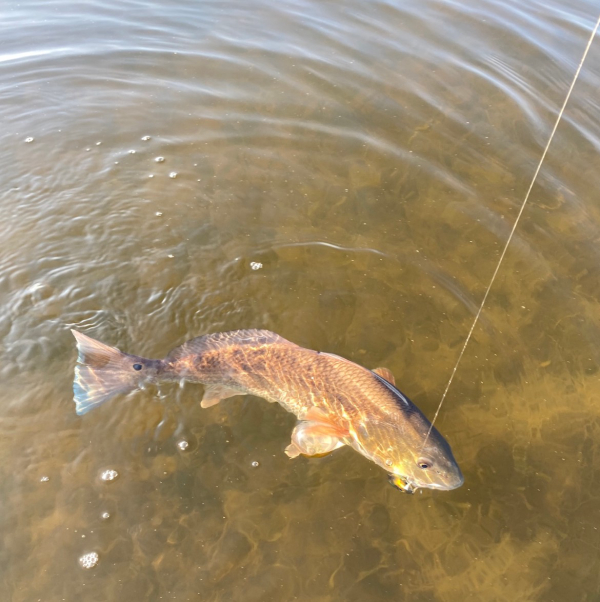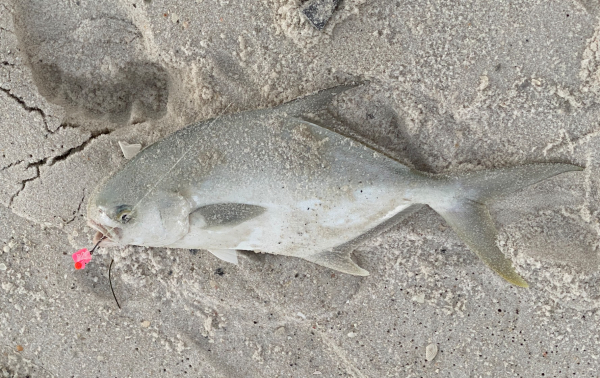
Spotted seatrout are rarely caught on the flats in north Florida in winter, but an extended warm spell can wake them up and turn on the bite. (Frank Sargeant)
We’re all inclined to push the seasons. When it’s still a month until the snook start showing up on the flats we’re out there flinging topwaters at the mangroves, and when we know damned well it’s too cold for the trout to be on the flats we’re slogging around in the turtle grass casting at jellyfish and mullet.
But it is possible to get lucky now and then if you get just a little help from Mother Nature.
That happened last week for me at Pensacola Beach, where we had been hiding out from the last dregs of winter before returning to north Alabama.
The water was still very chilly when we got there, 60 degrees at best, and not surprisingly there didn’t seem to be a fish of any stripe on the flats that first week. My guide buddies fishing up-country in the Blackwater and Escambia Rivers were whacking reds and sea trout in the deep cuts there on shrimp, but being the perverse sort of dedicated flats angler that I am, I wanted to find ‘em where I could see and catch them on artificials.
“Your funeral,” they told me.
They were definitely right that first week. Five days of wading and casting and the only thing I saw were some cold-killed catfish and trunkfish.
But the sun started shining, a south wind began to blow, and the water gradually eased up to as high as 64 on some flats in the afternoons. The warm south wind increased, 15 and then 20 mph—the surf turned into a roaring maelstrom, but the water on the north side of the island was pond-flat.
And in the back country it was like God had flipped the switch.

Redfish are more cold tolerant than trout, and a few warm afternoons can see them tailing on the flats at times. (Frank Sargeant)
Coming off a full moon, the tide was high in the afternoon and the sun beat down like it was April. I was able to fish in a t-shirt and shorts for the first time, leaving the waders in the truck.
I found a shallow, grassy cove, protected on the south side by dunes in the broad expanse of Gulf Islands National Seashore’s Fort Pickens area, where the otherwise rough water was flat. The grassy shoreline was alive with fiddler crabs, in some areas hundreds of them crawling over each other, and mullet were jumping just a yard from shore.
The first cast with a LiveTarget Scaled Sardine was eaten before I even flipped the bail. A fat 3-pound trout that fought like a 5-pounder and even jumped a couple times rather than just giving it the old yellow-mouth head shake. I released her, made another cast—and hooked another in the same spot.
For the next 10 casts straight, I hooked a trout, all of them 15 to 16-inchers, before I came up empty on one throw, then got two more before the well ran dry.
A little further down the shore, I saw a redfish stick up a rust-colored tail. I flipped the lure about 10’ ahead of the fish, twitched it twice, and the fish slammed it. Not a giant, but like the trout, the 4 pounder was amazingly energetic in the cool water.
There were two more warm afternoons and I caught reds and trout along that shore on both days—not as many, but enough to keep me interested. In the evenings, I watched guys with surf sticks catching pompano on the south side beach.

Pompano usually show up in Florida’s Panhandle waters in late March—but an unusually warm February can also turn on the bite. (Frank Sargeant)
“It’s too early for them, but I’m glad they’re here,” one of them told me. “They usually don’t show until the end of March.”
That night a front blew through, bringing 20 mph winds out of the northeast and air temperatures in the low 40’s, plunging the flats back to winter temperatures barely scraping 60. The flats fish disappeared as if they had never been there, and the surf fishermen quit showing up, as well.
It was a lucky accident, to be sure, to hit that unseasonable warm spell, but it goes to show us that the hope that springs eternal for all anglers sometimes is rewarded, and you for sure can’t catch ‘em sitting in the office.
— Frank Sargeant
Frankmako1@gmail.com